The Cambridge History of China. Vol. 06. Alien Regimes and Border States, 907-1368
Подождите немного. Документ загружается.

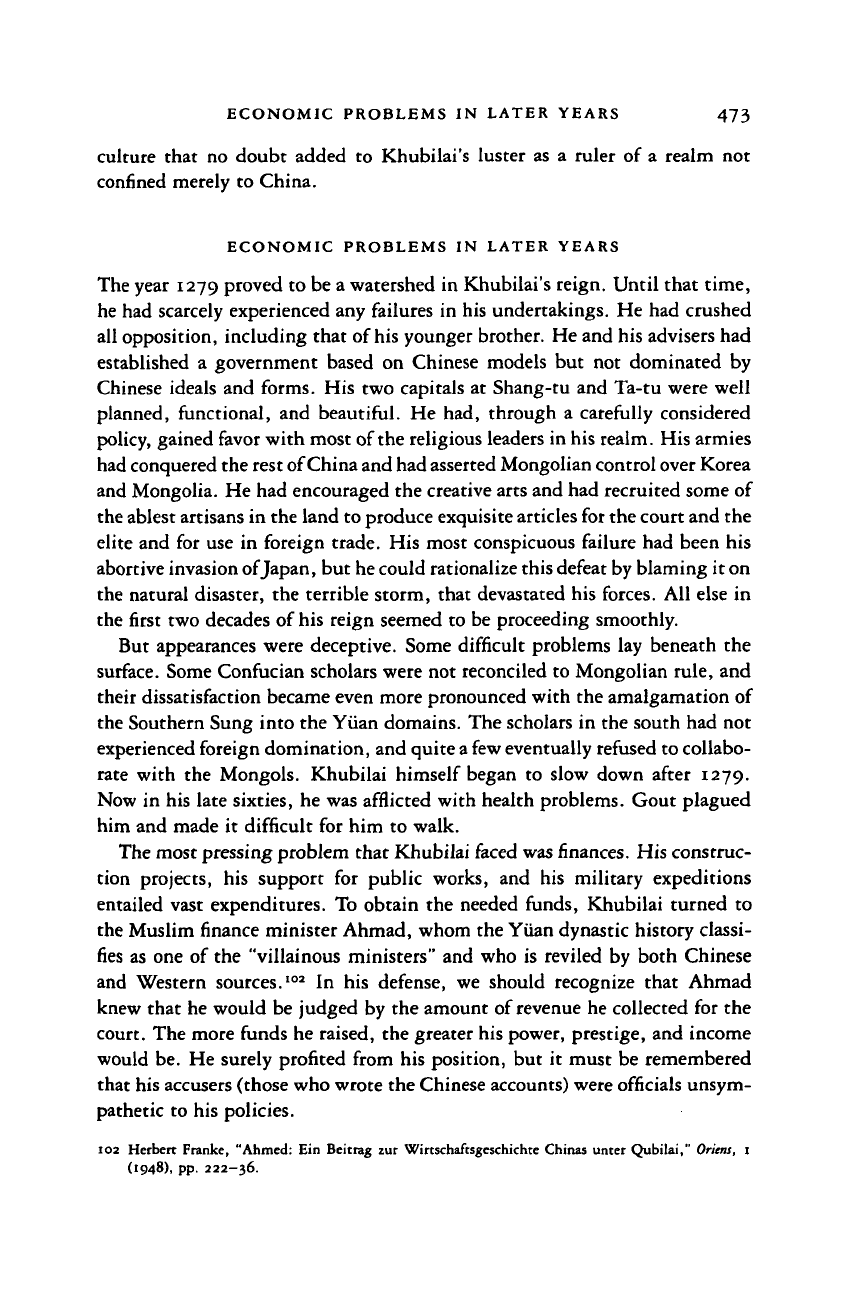
ECONOMIC PROBLEMS IN LATER YEARS 473
culture that no doubt added to Khubilai's luster as a ruler of a realm not
confined merely to China.
ECONOMIC PROBLEMS IN LATER YEARS
The year 1279 proved to be a watershed in Khubilai's reign. Until that time,
he had scarcely experienced any failures in his undertakings. He had crushed
all opposition, including that of his younger brother. He and his advisers had
established a government based on Chinese models but not dominated by
Chinese ideals and forms. His two capitals at Shang-tu and Ta-tu were well
planned, functional, and beautiful. He had, through a carefully considered
policy, gained favor with most of the religious leaders in his realm. His armies
had conquered the rest of China and had asserted Mongolian control over Korea
and Mongolia. He had encouraged the creative arts and had recruited some of
the ablest artisans in the land to produce exquisite articles for the court and the
elite and for use in foreign trade. His most conspicuous failure had been his
abortive invasion of Japan, but he could rationalize this defeat by blaming it on
the natural disaster, the terrible storm, that devastated his forces. All else in
the first two decades of his reign seemed to be proceeding smoothly.
But appearances were deceptive. Some difficult problems lay beneath the
surface. Some Confucian scholars were not reconciled to Mongolian rule, and
their dissatisfaction became even more pronounced with the amalgamation of
the Southern Sung into the Yuan domains. The scholars in the south had not
experienced foreign domination, and quite a few eventually refused to collabo-
rate with the Mongols. Khubilai himself began to slow down after 1279.
Now in his late sixties, he was afflicted with health problems. Gout plagued
him and made it difficult for him to walk.
The most pressing problem that Khubilai faced was finances. His construc-
tion projects, his support for public works, and his military expeditions
entailed vast expenditures. To obtain the needed funds, Khubilai turned to
the Muslim finance minister Ahmad, whom the Yuan dynastic history classi-
fies as one of the "villainous ministers" and who is reviled by both Chinese
and Western sources.
102
In his defense, we should recognize that Ahmad
knew that he would be judged by the amount of revenue he collected for the
court. The more funds he raised, the greater his power, prestige, and income
would be. He surely profited from his position, but it must be remembered
that his accusers (those who wrote the Chinese accounts) were officials unsym-
pathetic to his policies.
102 Herbert Franke, "Ahmed: Ein Beitrag zur Wirtschaftsgeschichte Chinas untet Qubilai," Orient, 1
(1948),
pp. 222-36.
Cambridge Histories Online © Cambridge University Press, 2008
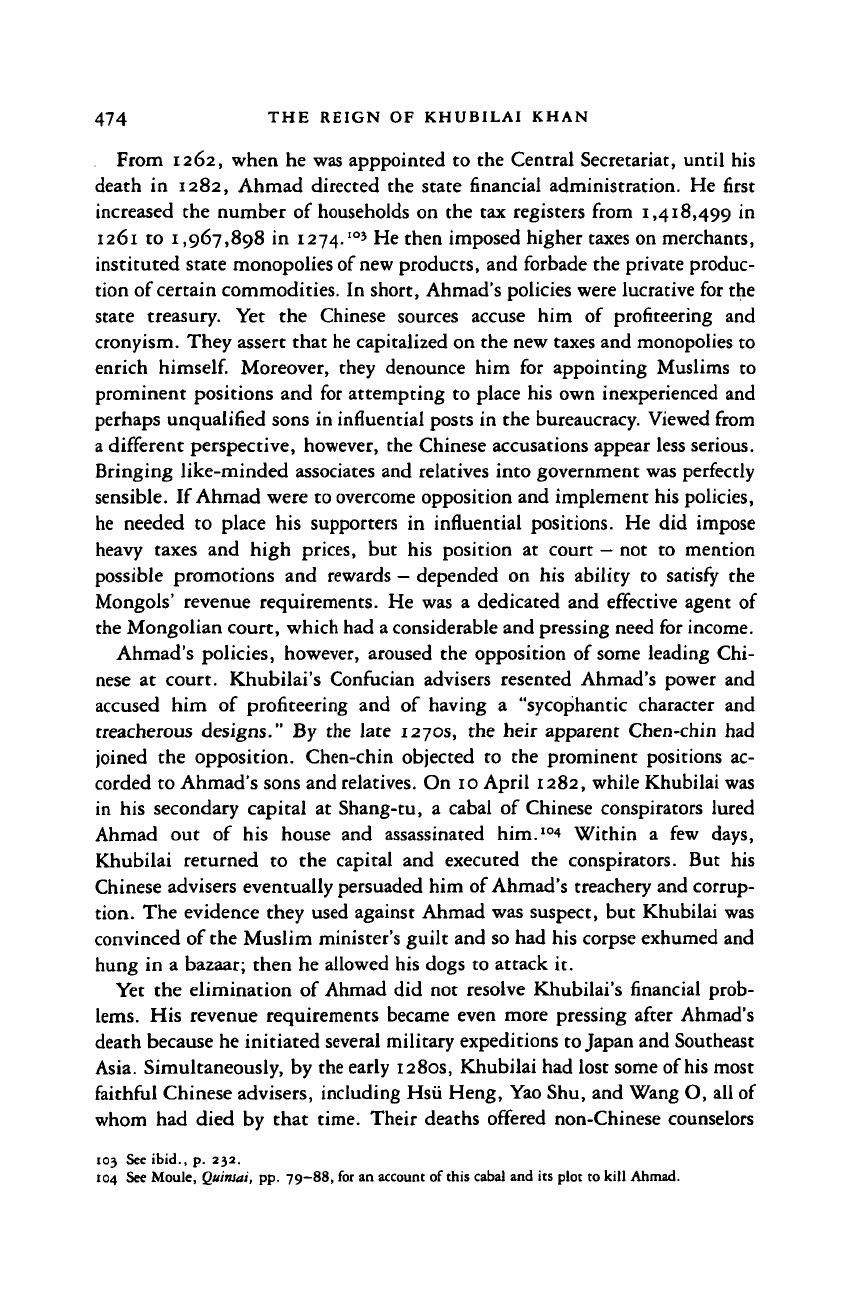
474 THE REIGN OF KHUBILAI KHAN
From 1262, when he was apppointed to the Central Secretariat, until his
death in 1282, Ahmad directed the state financial administration. He first
increased the number of households on the tax registers from
1,418,499
in
1261 to
1,967,898
in 1274.
IO
3 He then imposed higher taxes on merchants,
instituted state monopolies of
new
products, and forbade the private produc-
tion of certain commodities. In short, Ahmad's policies were lucrative for the
state treasury. Yet the Chinese sources accuse him of profiteering and
cronyism. They assert that he capitalized on the new taxes and monopolies to
enrich
himself.
Moreover, they denounce him for appointing Muslims to
prominent positions and for attempting to place his own inexperienced and
perhaps unqualified sons in influential posts in the bureaucracy. Viewed from
a different perspective, however, the Chinese accusations appear less serious.
Bringing like-minded associates and relatives into government was perfectly
sensible. If Ahmad were to overcome opposition and implement his policies,
he needed to place his supporters in influential positions. He did impose
heavy taxes and high prices, but his position at court
—
not to mention
possible promotions and rewards
—
depended on his ability to satisfy the
Mongols' revenue requirements. He was a dedicated and effective agent of
the Mongolian court, which had
a
considerable and pressing need for income.
Ahmad's policies, however, aroused the opposition of some leading Chi-
nese at court. Khubilai's Confucian advisers resented Ahmad's power and
accused him of profiteering and of having a "sycophantic character and
treacherous designs." By the late 1270s, the heir apparent Chen-chin had
joined the opposition. Chen-chin objected to the prominent positions ac-
corded to Ahmad's sons and relatives. On 10 April 1282, while Khubilai was
in his secondary capital at Shang-tu, a cabal of Chinese conspirators lured
Ahmad out of his house and assassinated him.
10
* Within a few days,
Khubilai returned to the capital and executed the conspirators. But his
Chinese advisers eventually persuaded him of Ahmad's treachery and corrup-
tion. The evidence they used against Ahmad was suspect, but Khubilai was
convinced of the Muslim minister's guilt and so had his corpse exhumed and
hung in a bazaar; then he allowed his dogs to attack it.
Yet the elimination of Ahmad did not resolve Khubilai's financial prob-
lems.
His revenue requirements became even more pressing after Ahmad's
death because he initiated several military expeditions
to
Japan and Southeast
Asia. Simultaneously, by the early 1280s, Khubilai had lost some of his most
faithful Chinese advisers, including Hsu Heng, Yao Shu, and Wang O, all of
whom had died by that time. Their deaths offered non-Chinese counselors
103 See ibid., p. 232.
104 See Moule, Quinsai, pp. 79—88, for an account of this cabal and its plot to kill Ahmad.
Cambridge Histories Online © Cambridge University Press, 2008
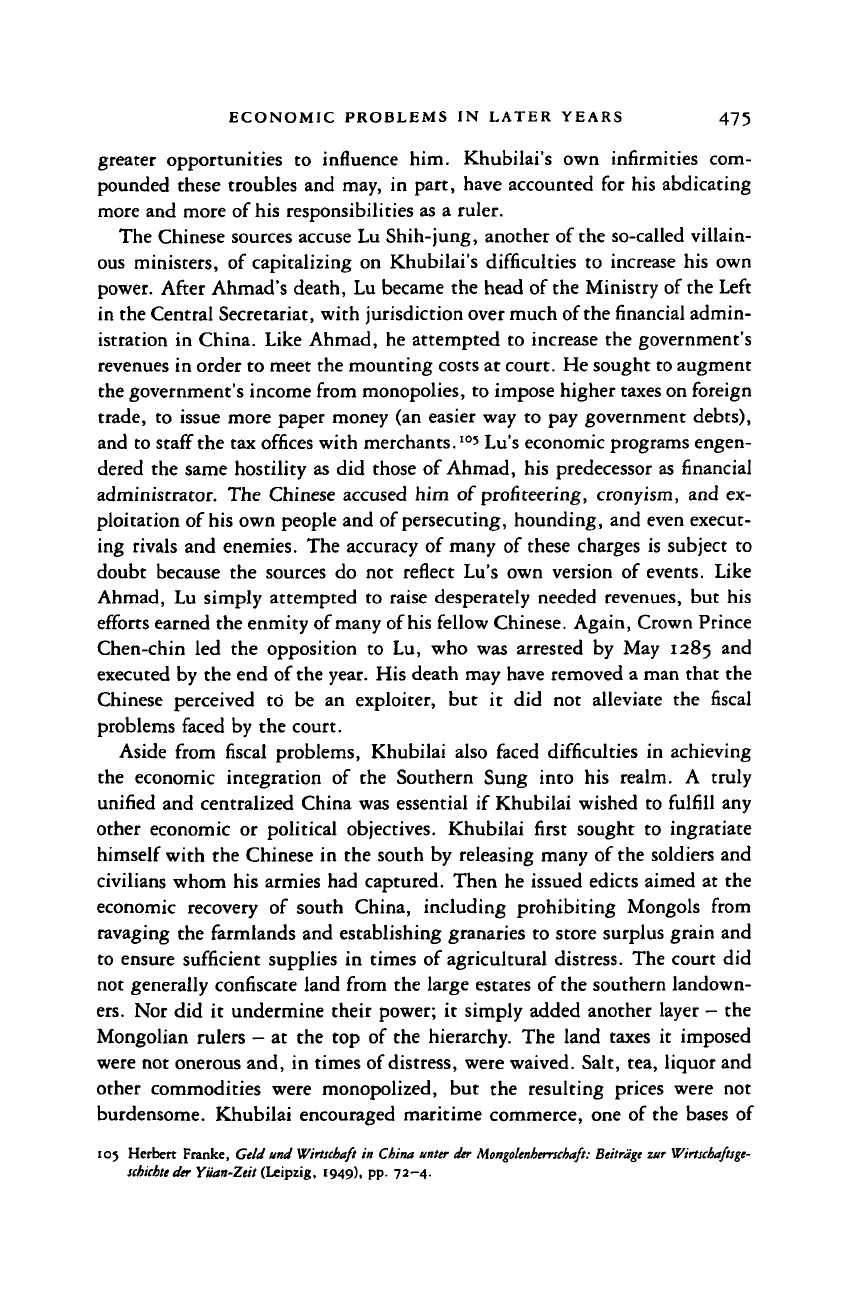
ECONOMIC PROBLEMS IN LATER YEARS 475
greater opportunities to influence him. Khubilai's own infirmities com-
pounded these troubles and may, in part, have accounted for his abdicating
more and more of his responsibilities as a ruler.
The Chinese sources accuse Lu Shih-jung, another of the so-called villain-
ous ministers, of capitalizing on Khubilai's difficulties to increase his own
power. After Ahmad's death, Lu became the head of the Ministry of the Left
in the Central Secretariat, with jurisdiction over much of the financial admin-
istration in China. Like Ahmad, he attempted to increase the government's
revenues in order to meet the mounting costs at court. He sought to augment
the government's income from monopolies, to impose higher taxes on foreign
trade, to issue more paper money (an easier way to pay government debts),
and to staff the tax offices with merchants.
10
' Lu's economic programs engen-
dered the same hostility as did those of Ahmad, his predecessor as financial
administrator. The Chinese accused him of profiteering, cronyism, and ex-
ploitation of his own people and of persecuting, hounding, and even execut-
ing rivals and enemies. The accuracy of many of these charges is subject to
doubt because the sources do not reflect Lu's own version of events. Like
Ahmad, Lu simply attempted to raise desperately needed revenues, but his
efforts earned the enmity of many of his fellow Chinese. Again, Crown Prince
Chen-chin led the opposition to Lu, who was arrested by May 1285 and
executed by the end of the year. His death may have removed a man that the
Chinese perceived to be an exploiter, but it did not alleviate the fiscal
problems faced by the court.
Aside from fiscal problems, Khubilai also faced difficulties in achieving
the economic integration of the Southern Sung into his realm. A truly
unified and centralized China was essential if Khubilai wished to fulfill any
other economic or political objectives. Khubilai first sought to ingratiate
himself with the Chinese in the south by releasing many of the soldiers and
civilians whom his armies had captured. Then he issued edicts aimed at the
economic recovery of south China, including prohibiting Mongols from
ravaging the farmlands and establishing granaries to store surplus grain and
to ensure sufficient supplies in times of agricultural distress. The court did
not generally confiscate land from the large estates of the southern landown-
ers.
Nor did it undermine their power; it simply added another layer
—
the
Mongolian rulers
—
at the top of the hierarchy. The land taxes it imposed
were not onerous and, in times of distress, were waived. Salt, tea, liquor and
other commodities were monopolized, but the resulting prices were not
burdensome. Khubilai encouraged maritime commerce, one of the bases of
105 Herbert Franke, Geld und Wirtichaft in China unter der Mongolenbemcbaft: Beilrage zur Wirucbaftige-
schichte
der Yiian-Zeit (Leipzig, 1949), pp- 72—4.
Cambridge Histories Online © Cambridge University Press, 2008
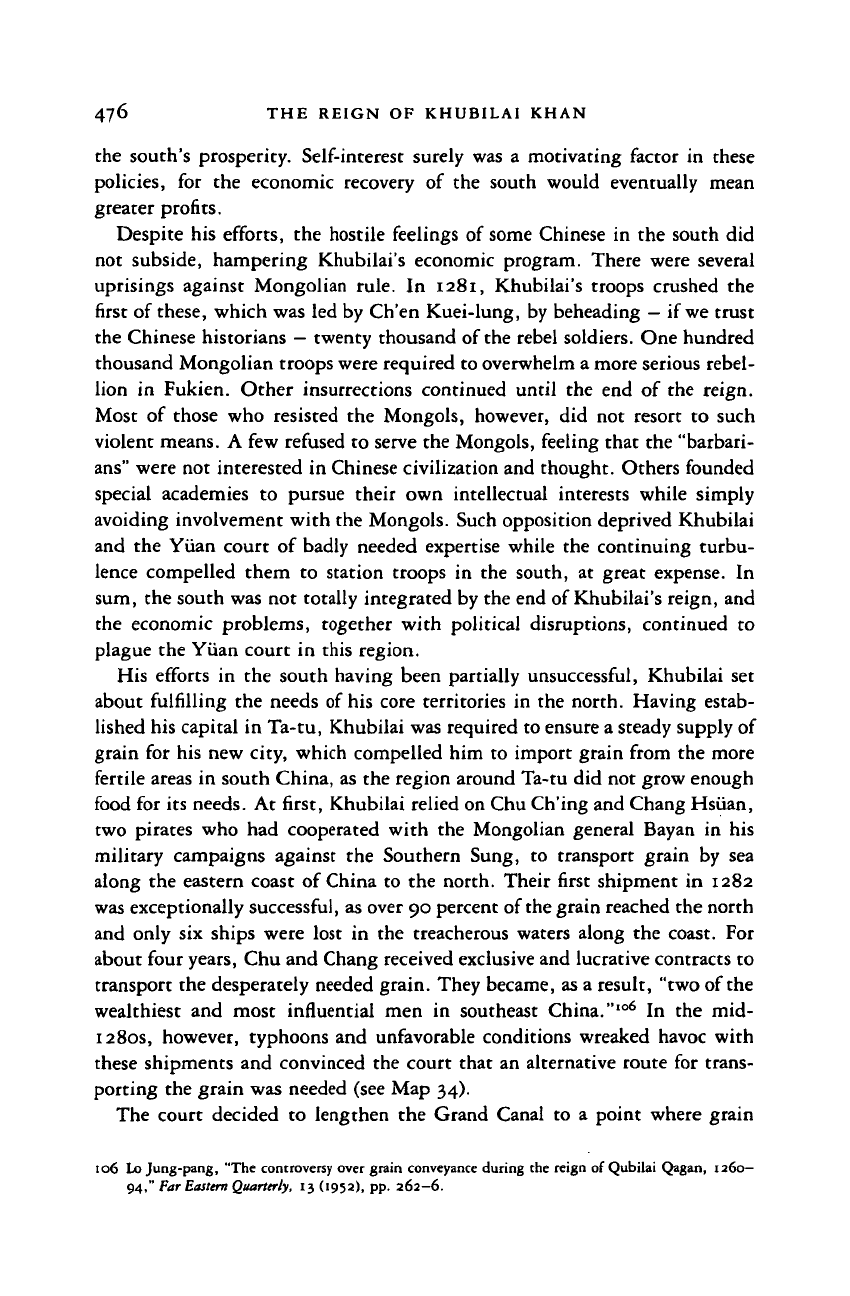
476 THE REIGN OF KHUBILAI KHAN
the south's prosperity. Self-interest surely was a motivating factor in these
policies, for the economic recovery of the south would eventually mean
greater profits.
Despite his efforts, the hostile feelings of some Chinese in the south did
not subside, hampering Khubilai's economic program. There were several
uprisings against Mongolian rule. In 1281, Khubilai's troops crushed the
first of these, which was led by Ch'en Kuei-lung, by beheading - if
we
trust
the Chinese historians - twenty thousand of the rebel soldiers. One hundred
thousand Mongolian troops were required to overwhelm a more serious rebel-
lion in Fukien. Other insurrections continued until the end of the reign.
Most of those who resisted the Mongols, however, did not resort to such
violent means. A few refused to serve the Mongols, feeling that the "barbari-
ans"
were not interested in Chinese civilization and thought. Others founded
special academies to pursue their own intellectual interests while simply
avoiding involvement with the Mongols. Such opposition deprived Khubilai
and the Yuan court of badly needed expertise while the continuing turbu-
lence compelled them to station troops in the south, at great expense. In
sum, the south was not totally integrated by the end of Khubilai's reign, and
the economic problems, together with political disruptions, continued to
plague the Yuan court in this region.
His efforts in the south having been partially unsuccessful, Khubilai set
about fulfilling the needs of his core territories in the north. Having estab-
lished his capital in Ta-tu, Khubilai was required to ensure a steady supply of
grain for his new city, which compelled him to import grain from the more
fertile areas in south China, as the region around Ta-tu did not grow enough
food for its needs. At first, Khubilai relied on Chu Ch'ing and Chang Hsiian,
two pirates who had cooperated with the Mongolian general Bayan in his
military campaigns against the Southern Sung, to transport grain by sea
along the eastern coast of China to the north. Their first shipment in 1282
was exceptionally successful, as over 90 percent of
the
grain reached the north
and only six ships were lost in the treacherous waters along the coast. For
about four years, Chu and Chang received exclusive and lucrative contracts to
transport the desperately needed grain. They became, as a result, "two of the
wealthiest and most influential men in southeast China."
106
In the mid-
12808,
however, typhoons and unfavorable conditions wreaked havoc with
these shipments and convinced the court that an alternative route for trans-
porting the grain was needed (see Map 34).
The court decided to lengthen the Grand Canal to a point where grain
106 Lo Jung-pang, "The controversy over grain conveyance during the reign of Qubilai Qagan, 1260—
94,"
Far
Eastern
Quarterly, 13 (1952), pp. 262—6.
Cambridge Histories Online © Cambridge University Press, 2008
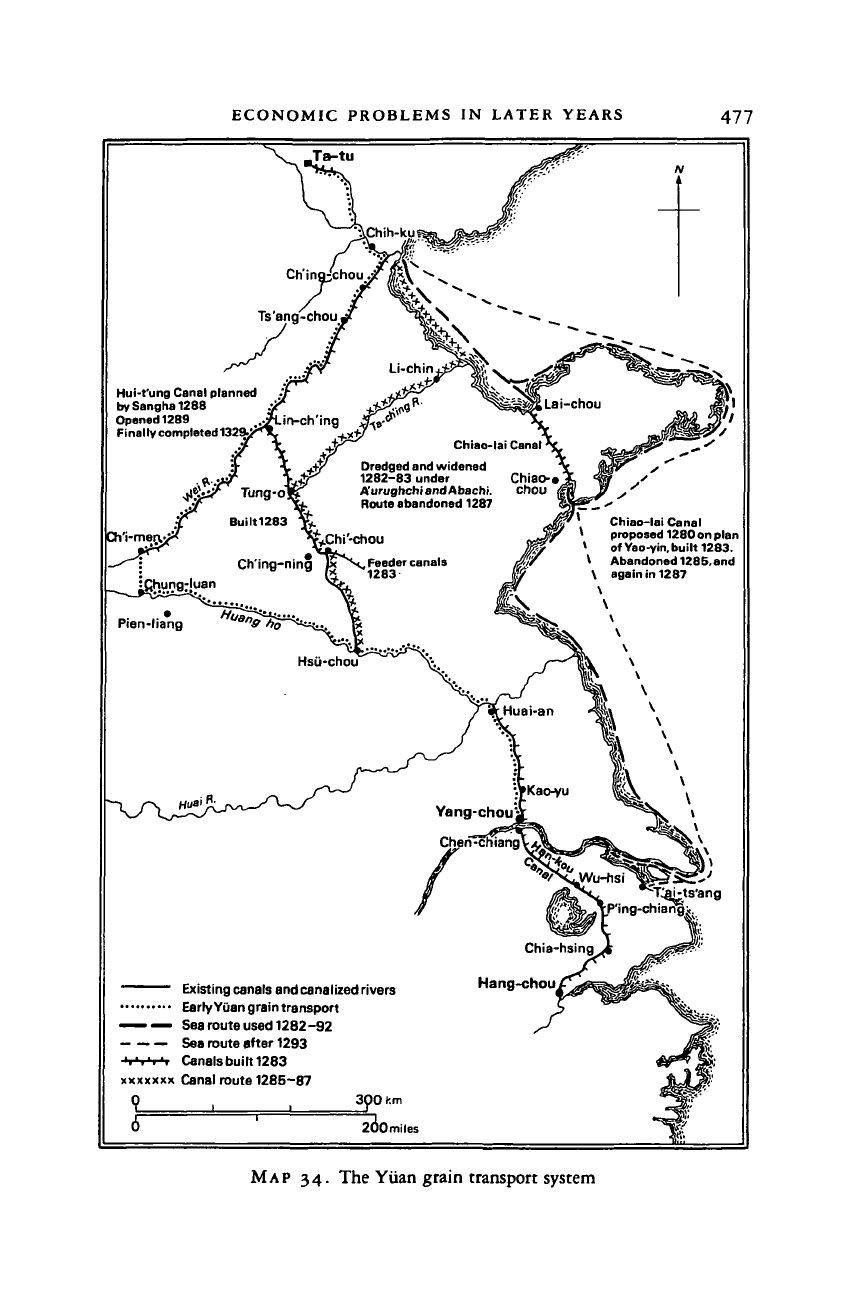
ECONOMIC PROBLEMS
IN
LATER YEARS
477
Hui-t'ung Canal planned
bySangha1288
Opened 1289 jTLin-ch'ing
Finallvcompleted1329
J
}
>
*% ±#i
Ch'ingjchou
Ts'ang-chou
Dredged and widened
1282-83 under Chiao-e
A'urughchiandAbachi. chou
Route abandoned 1287
*
proposed 1280
on
plan
of
Yao-yin.
built 1283.
Abandoned
1285.
and
\
again in 1287
\
Feeder canals
1283
Yang-chou
Chen-Chiang
^^
Wu-hsi
ing-chiarigj
Chia-hsing
Hang-chou
Existing canals
and
canalized rivers
Earh/YQan grain
transport
——
^
Sea
route
used
1282-92
Sea route after 1293
'I'I'I'I
Canals
built
1283
xxxxxxx Canal route 1285-87
0 300 kn
200miles
MAP
34.
The Yiian grain transport system
Cambridge Histories Online © Cambridge University Press, 2008
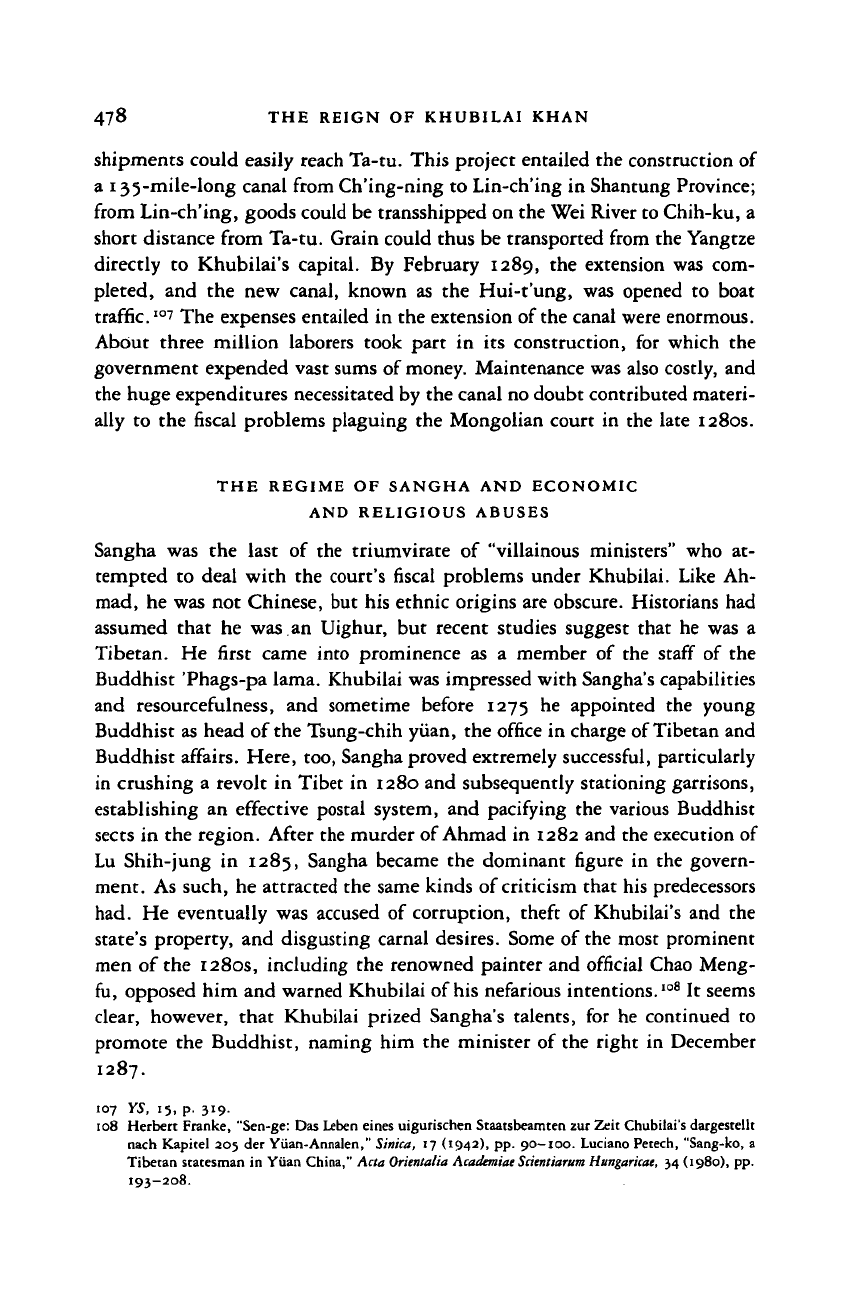
478 THE REIGN OF KHUBILAI KHAN
shipments could easily reach Ta-tu. This project entailed the construction of
a 135-mile-long canal from Ch'ing-ning to Lin-ch'ing in Shantung Province;
from Lin-ch'ing, goods could be transshipped on the Wei River to Chih-ku, a
short distance from Ta-tu. Grain could thus be transported from the Yangtze
directly
to
Khubilai's capital. By February 1289, the extension was com-
pleted, and the new canal, known as the Hui-t'ung, was opened
to
boat
traffic.
IO
? The expenses entailed in the extension of the canal were enormous.
About three million laborers took part
in
its construction, for which the
government expended vast sums of
money.
Maintenance was also costly, and
the huge expenditures necessitated by the canal no doubt contributed materi-
ally to the fiscal problems plaguing the Mongolian court in the late 1280s.
THE REGIME OF SANGHA AND ECONOMIC
AND RELIGIOUS ABUSES
Sangha was the last
of
the triumvirate
of
"villainous ministers" who at-
tempted to deal with the court's fiscal problems under Khubilai. Like Ah-
mad, he was not Chinese, but his ethnic origins are obscure. Historians had
assumed that he was.an Uighur, but recent studies suggest that he was
a
Tibetan.
He
first came into prominence as
a
member
of
the staff of the
Buddhist 'Phags-pa lama. Khubilai was impressed with Sangha's capabilities
and resourcefulness, and sometime before 1275 he appointed the young
Buddhist as head of the Tsung-chih yuan, the office in charge of Tibetan and
Buddhist affairs. Here, too, Sangha proved extremely successful, particularly
in crushing a revolt in Tibet in 1280 and subsequently stationing garrisons,
establishing an effective postal system, and pacifying the various Buddhist
sects in the region. After the murder of Ahmad in 1282 and the execution of
Lu Shih-jung
in
1285, Sangha became the dominant figure in the govern-
ment. As such, he attracted the same kinds of criticism that his predecessors
had. He eventually was accused of corruption, theft of Khubilai's and the
state's property, and disgusting carnal desires. Some of the most prominent
men of the 1280s, including the renowned painter and official Chao Meng-
fu, opposed him and warned Khubilai of
his
nefarious intentions.
108
It seems
clear, however, that Khubilai prized Sangha's talents, for he continued
to
promote the Buddhist, naming him the minister of the right in December
1287.
107 YS, 15, p. 319.
108 Herbert Franke, "Sen-ge: Das Leben eines uigurischen Staatsbeamten zur Zeit Chubilai's dargestellt
nach Kapitel 205 der Yiian-Annalen," Sinica, 17 (1942), pp. 90-100. Luciano Petech, "Sang-ko,
a
Tibetan statesman in Yuan China," Ada Orientalia Academiat
Scientiarum
Hungaricae,
34 (1980), pp.
193—208.
Cambridge Histories Online © Cambridge University Press, 2008
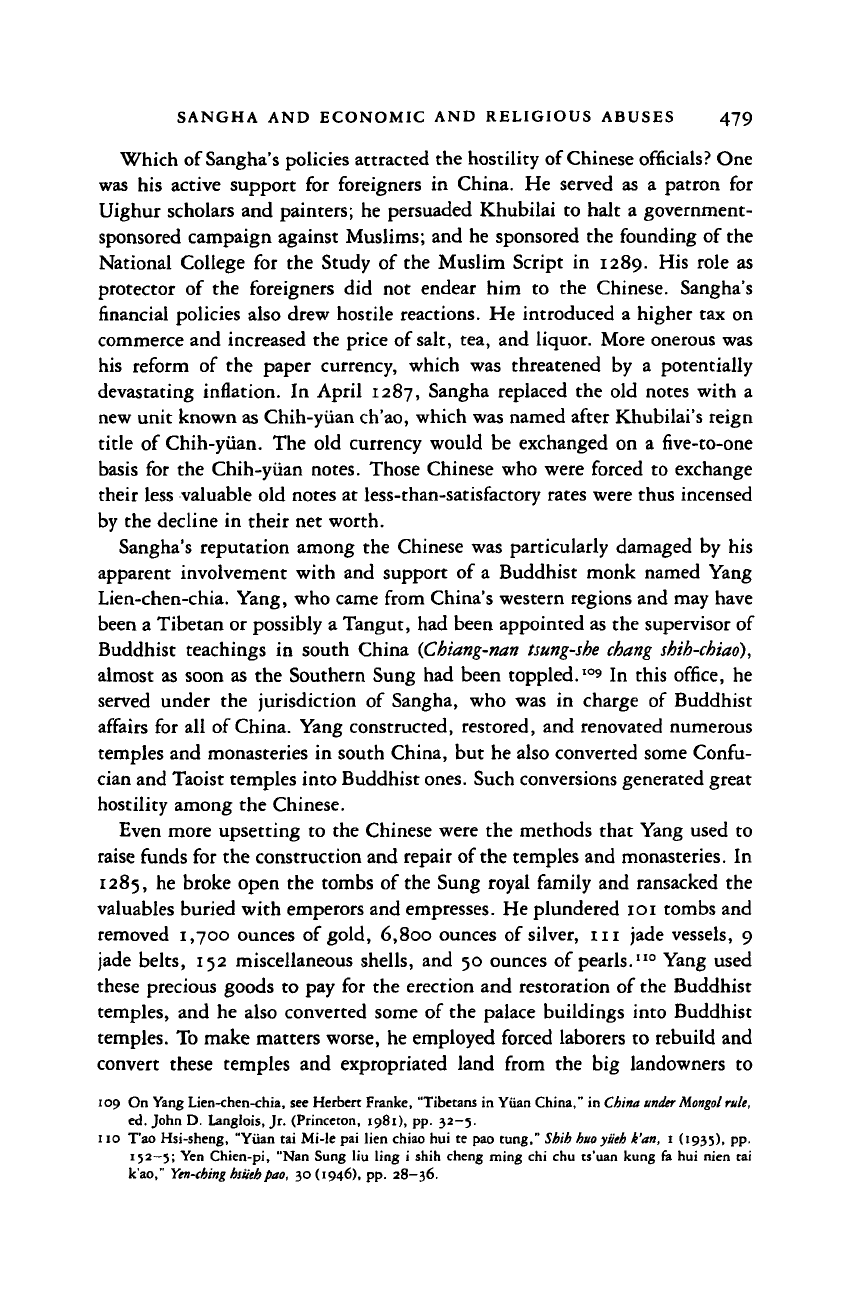
SANGHA AND ECONOMIC AND RELIGIOUS ABUSES 479
Which of Sangha's policies attracted the hostility of Chinese officials? One
was his active support for foreigners in China. He served as a patron for
Uighur scholars and painters; he persuaded Khubilai to halt a government-
sponsored campaign against Muslims; and he sponsored the founding of the
National College for the Study of the Muslim Script in 1289. His role as
protector of the foreigners did not endear him to the Chinese. Sangha's
financial policies also drew hostile reactions. He introduced a higher tax on
commerce and increased the price of salt, tea, and liquor. More onerous was
his reform of the paper currency, which was threatened by a potentially
devastating inflation. In April 1287, Sangha replaced the old notes with a
new unit known as Chih-yuan ch'ao, which was named after Khubilai's reign
title of Chih-yuan. The old currency would be exchanged on a five-to-one
basis for the Chih-yuan notes. Those Chinese who were forced to exchange
their less valuable old notes at less-than-satisfactory rates were thus incensed
by the decline in their net worth.
Sangha's reputation among the Chinese was particularly damaged by his
apparent involvement with and support of a Buddhist monk named Yang
Lien-chen-chia. Yang, who came from China's western regions and may have
been a Tibetan or possibly a Tangut, had been appointed as the supervisor of
Buddhist teachings in south China {Chiang-nan tsung-she chang shih-chiao),
almost as soon as the Southern Sung had been toppled.
IO
9
In this office, he
served under the jurisdiction of Sangha, who was in charge of Buddhist
affairs for all of China. Yang constructed, restored, and renovated numerous
temples and monasteries in south China, but he also converted some Confu-
cian and Taoist temples into Buddhist ones. Such conversions generated great
hostility among the Chinese.
Even more upsetting to the Chinese were the methods that Yang used to
raise funds for the construction and repair of the temples and monasteries. In
1285,
he broke open the tombs of the Sung royal family and ransacked the
valuables buried with emperors and empresses. He plundered 101 tombs and
removed 1,700 ounces of gold, 6,800 ounces of silver, 111 jade vessels, 9
jade belts, 152 miscellaneous shells, and 50 ounces of pearls.'
10
Yang used
these precious goods to pay for the erection and restoration of the Buddhist
temples, and he also converted some of the palace buildings into Buddhist
temples. To make matters worse, he employed forced laborers to rebuild and
convert these temples and expropriated land from the big landowners to
109 On Yang Lien-chen-chia, see Herbert Franke, "Tibetans in Yuan China," in
China under Mongol
rule,
ed. John D. Langiois, Jr. (Princeton, 1981), pp.
32—5.
no T'ao Hsi-sheng, "Yuan tai Mi-le pai lien chiao hui te pao tung," Shih
huoyueh
k'an, 1 (1933), pp.
132-3;
Yen Chien-pi, "Nan Sung liu ling i shih cheng ming chi chu ts'uan kung h hui nien tai
k'ao,"
Yen-ching hsiieh
pao,
30(1946), pp. 28—36.
Cambridge Histories Online © Cambridge University Press, 2008
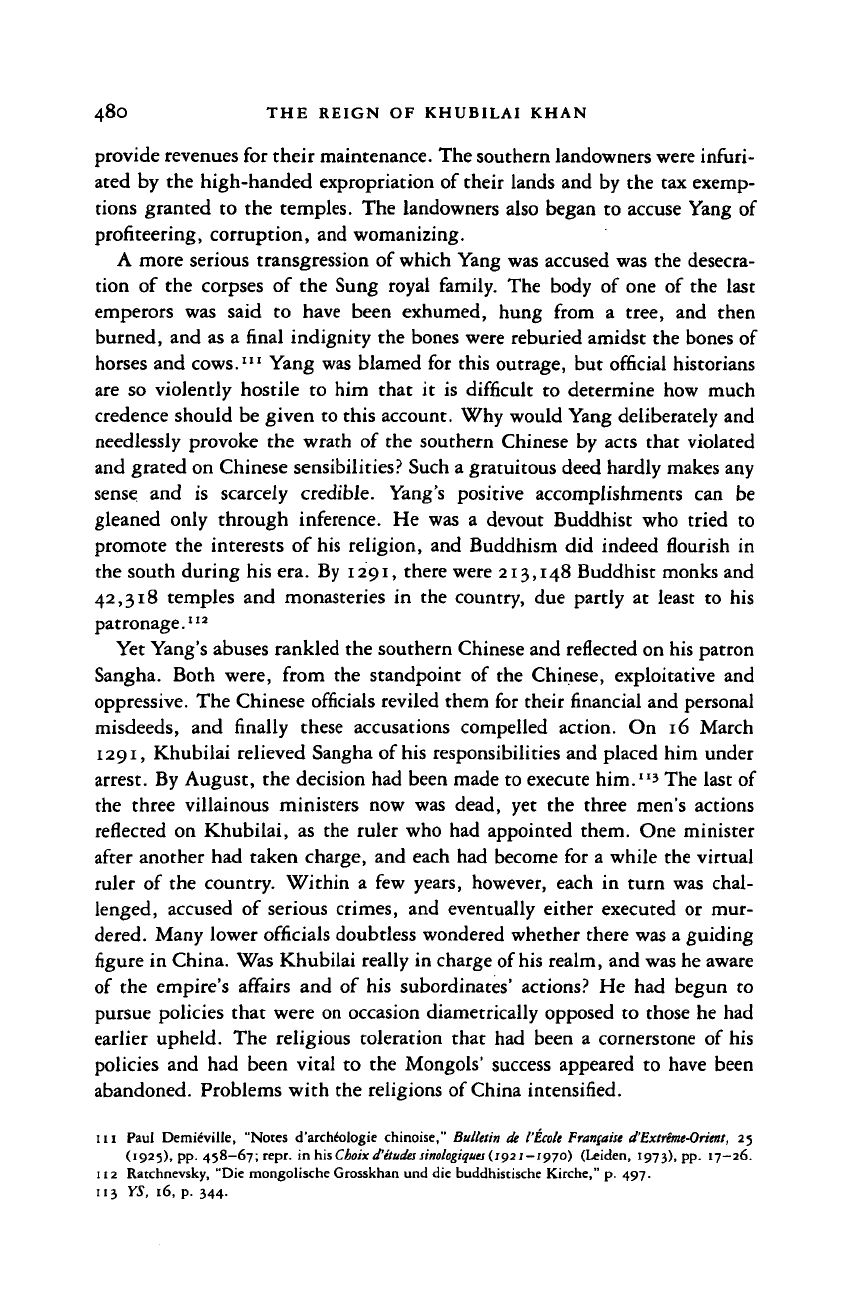
480 THE REIGN OF KHUBILAI KHAN
provide revenues for their maintenance. The southern landowners were infuri-
ated by the high-handed expropriation of their lands and by the tax exemp-
tions granted
to
the temples. The landowners also began
to
accuse Yang of
profiteering, corruption, and womanizing.
A more serious transgression of which Yang was accused was the desecra-
tion
of
the corpses
of
the Sung royal family. The body
of
one
of
the last
emperors
was
said
to
have been exhumed, hung from
a
tree,
and
then
burned, and as
a
final indignity the bones were reburied amidst the bones of
horses and cows.
111
Yang was blamed for this outrage, but official historians
are
so
violently hostile
to
him that
it is
difficult
to
determine how much
credence should be given to this account. Why would Yang deliberately and
needlessly provoke
the
wrath
of
the southern Chinese by acts that violated
and grated on Chinese sensibilities? Such a gratuitous deed hardly makes any
sense
and is
scarcely credible. Yang's positive accomplishments
can be
gleaned only through inference.
He
was
a
devout Buddhist who tried
to
promote the interests
of
his religion, and Buddhism did indeed flourish
in
the south during his era. By 1291, there were 213,148 Buddhist monks and
42,318 temples
and
monasteries
in
the country, due partly
at
least
to his
patronage.
112
Yet Yang's abuses rankled the southern Chinese and reflected on his patron
Sangha. Both were, from
the
standpoint
of
the Chinese, exploitative and
oppressive. The Chinese officials reviled them for their financial and personal
misdeeds,
and
finally these accusations compelled action.
On 16
March
1291,
Khubilai relieved Sangha of his responsibilities and placed him under
arrest. By August, the decision had been made to execute him.
11
* The last of
the three villainous ministers now was dead,
yet the
three men's actions
reflected
on
Khubilai,
as
the ruler who had appointed them. One minister
after another had taken charge, and each had become for
a
while the virtual
ruler
of
the country. Within
a
few years, however, each
in
turn was chal-
lenged, accused
of
serious crimes,
and
eventually either executed
or
mur-
dered. Many lower officials doubtless wondered whether there was a guiding
figure in China. Was Khubilai really in charge of
his
realm, and was he aware
of the empire's affairs and
of
his subordinates' actions?
He
had begun
to
pursue policies that were on occasion diametrically opposed
to
those he had
earlier upheld. The religious toleration that had been
a
cornerstone
of
his
policies and had been vital
to
the Mongols' success appeared
to
have been
abandoned. Problems with the religions of China intensified.
111 Paul Demieville, "Notes d'archeologie chinoise," Bulletin
de
I'Ecole
Frangaise
d'Extrem-Orimt,
25
(1925),
pp. 458—67; repr.
in
h\%Cboixd
l
itudaiinologiquti(ig2i—1970) (Leiden, 1973), pp. 17—26.
112 Ratchnevsky, "Die mongolische Grosskhan und die buddhistische Kirche,"
p. 497.
113
YS,
16, p. 344.
Cambridge Histories Online © Cambridge University Press, 2008
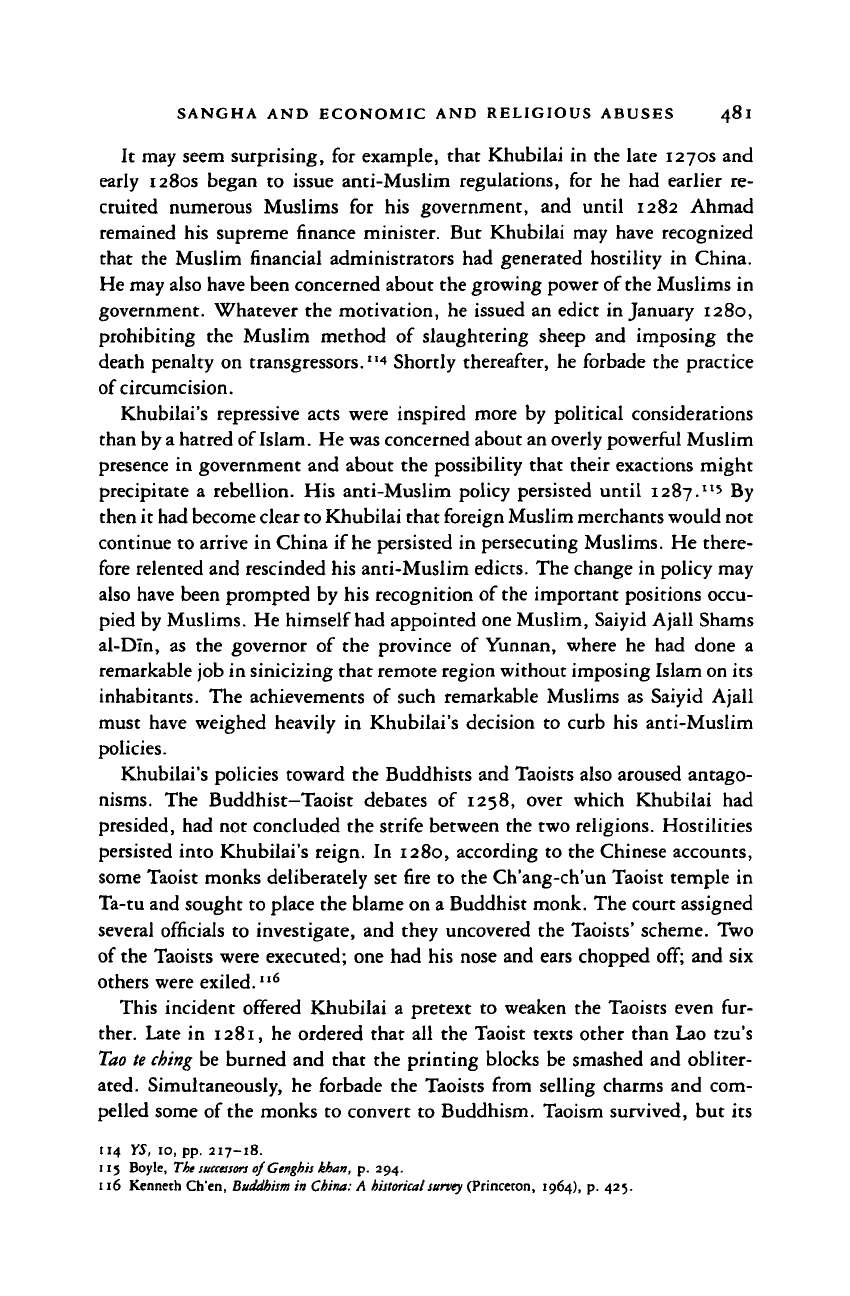
SANGHA AND ECONOMIC AND RELIGIOUS ABUSES 481
It may seem surprising, for example, that Khubilai in the late 1270s and
early 1280s began to issue anti-Muslim regulations, for he had earlier re-
cruited numerous Muslims for his government, and until 1282 Ahmad
remained his supreme finance minister. But Khubilai may have recognized
that the Muslim financial administrators had generated hostility in China.
He may also have been concerned about the growing power of
the
Muslims in
government. Whatever the motivation, he issued an edict in January 1280,
prohibiting the Muslim method of slaughtering sheep and imposing the
death penalty on transgressors."
4
Shortly thereafter, he forbade the practice
of circumcision.
Khubilai's repressive acts were inspired more by political considerations
than by
a
hatred of Islam. He was concerned about an overly powerful Muslim
presence in government and about the possibility that their exactions might
precipitate a rebellion. His anti-Muslim policy persisted until 1287."
5
By
then it had become clear to Khubilai that foreign Muslim merchants would not
continue to arrive in China if
he
persisted in persecuting Muslims. He there-
fore relented and rescinded his anti-Muslim edicts. The change in policy may
also have been prompted by his recognition of the important positions occu-
pied by Muslims. He himself had appointed one Muslim, Saiyid Ajall Shams
al-DIn, as the governor of the province of Yunnan, where he had done a
remarkable job in sinicizing that remote region without imposing Islam on its
inhabitants. The achievements of such remarkable Muslims as Saiyid Ajall
must have weighed heavily in Khubilai's decision to curb his anti-Muslim
policies.
Khubilai's policies toward the Buddhists and Taoists also aroused antago-
nisms. The Buddhist—Taoist debates of 1258, over which Khubilai had
presided, had not concluded the strife between the two religions. Hostilities
persisted into Khubilai's reign. In 1280, according to the Chinese accounts,
some Taoist monks deliberately set fire to the Ch'ang-ch'un Taoist temple in
Ta-tu and sought to place the blame on a Buddhist monk. The court assigned
several officials to investigate, and they uncovered the Taoists' scheme. Two
of the Taoists were executed; one had his nose and ears chopped off; and six
others were exiled."
6
This incident offered Khubilai a pretext to weaken the Taoists even fur-
ther. Late in 1281, he ordered that all the Taoist texts other than Lao tzu's
Tao te ching
be burned and that the printing blocks be smashed and obliter-
ated. Simultaneously, he forbade the Taoists from selling charms and com-
pelled some of the monks to convert to Buddhism. Taoism survived, but its
114 YS, io, pp.
217—18.
115 Boyle, The
successors
of
Genghis
khati, p. 294.
116 Kenneth Ch'en, Buddhism in China: A historical
survey
(Princeton, 1964), p. 425.
Cambridge Histories Online © Cambridge University Press, 2008
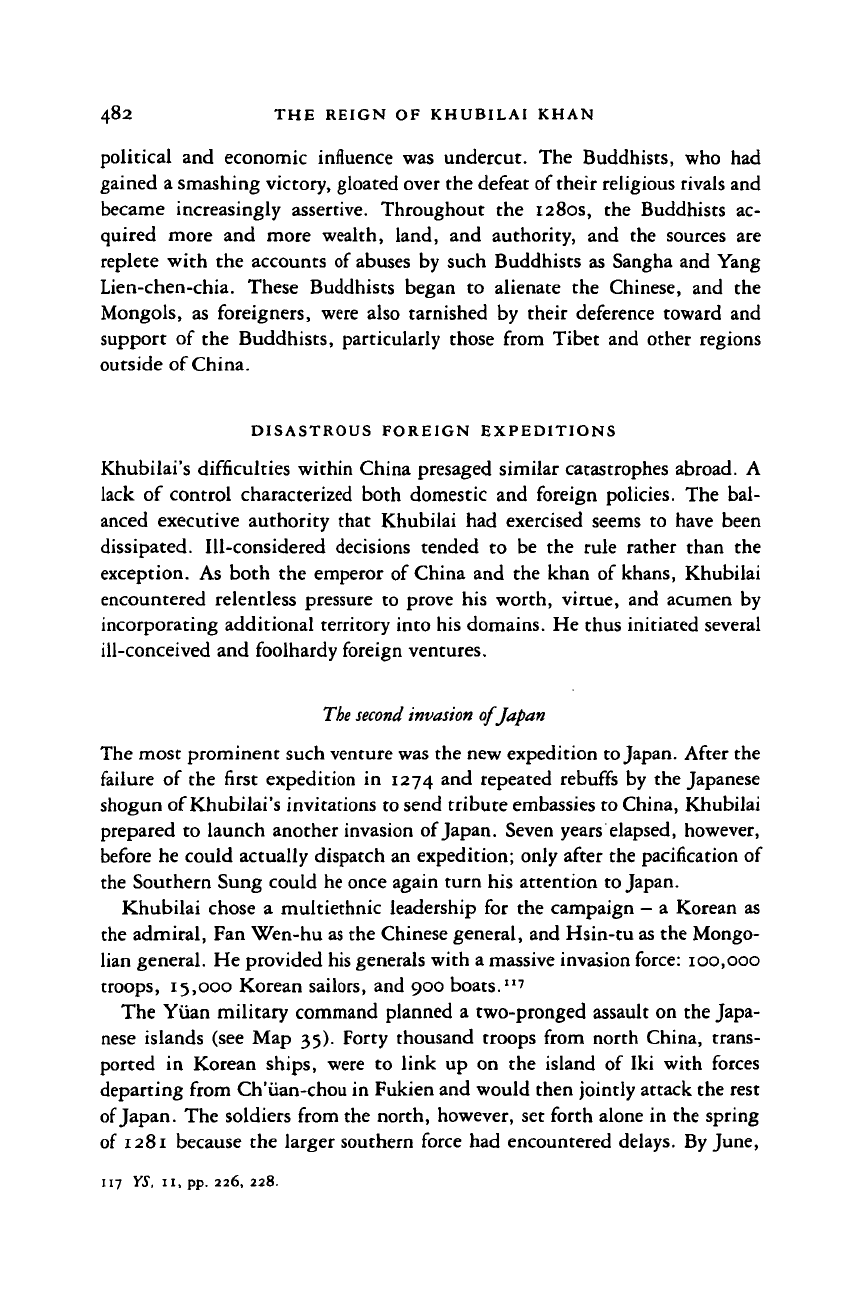
482 THE REIGN OF KHUBILAI KHAN
political and economic influence was undercut. The Buddhists, who had
gained a smashing victory, gloated over the defeat of their religious rivals and
became increasingly assertive. Throughout the 1280s, the Buddhists ac-
quired more and more wealth, land, and authority, and the sources are
replete with the accounts of abuses by such Buddhists as Sangha and Yang
Lien-chen-chia. These Buddhists began to alienate the Chinese, and the
Mongols, as foreigners, were also tarnished by their deference toward and
support of the Buddhists, particularly those from Tibet and other regions
outside of China.
DISASTROUS FOREIGN EXPEDITIONS
Khubilai's difficulties within China presaged similar catastrophes abroad. A
lack of control characterized both domestic and foreign policies. The bal-
anced executive authority that Khubilai had exercised seems to have been
dissipated. Ill-considered decisions tended to be the rule rather than the
exception. As both the emperor of China and the khan of khans, Khubilai
encountered relentless pressure to prove his worth, virtue, and acumen by
incorporating additional territory into his domains. He thus initiated several
ill-conceived and foolhardy foreign ventures.
The second invasion of Japan
The most prominent such venture was the new expedition
to
Japan.
After the
failure of the first expedition in 1274 and repeated rebuffs by the Japanese
shogun of Khubilai's invitations to send tribute embassies to China, Khubilai
prepared to launch another invasion of Japan. Seven years elapsed, however,
before he could actually dispatch an expedition; only after the pacification of
the Southern Sung could he once again turn his attention to Japan.
Khubilai chose a multiethnic leadership for the campaign - a Korean as
the admiral, Fan Wen-hu as the Chinese general, and Hsin-tu as the Mongo-
lian general. He provided his generals with a massive invasion force: 100,000
troops, 15,000 Korean sailors, and 900 boats."
7
The Yuan military command planned a two-pronged assault on the Japa-
nese islands (see Map 35). Forty thousand troops from north China, trans-
ported in Korean ships, were to link up on the island of Iki with forces
departing from Ch'iian-chou in Fukien and would then jointly attack the rest
of Japan. The soldiers from the north, however, set forth alone in the spring
of 1281 because the larger southern force had encountered delays. By June,
117 YS, 11, pp. 226, 228.
Cambridge Histories Online © Cambridge University Press, 2008
